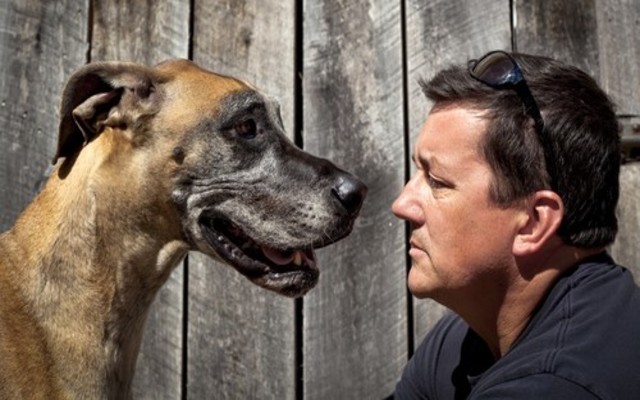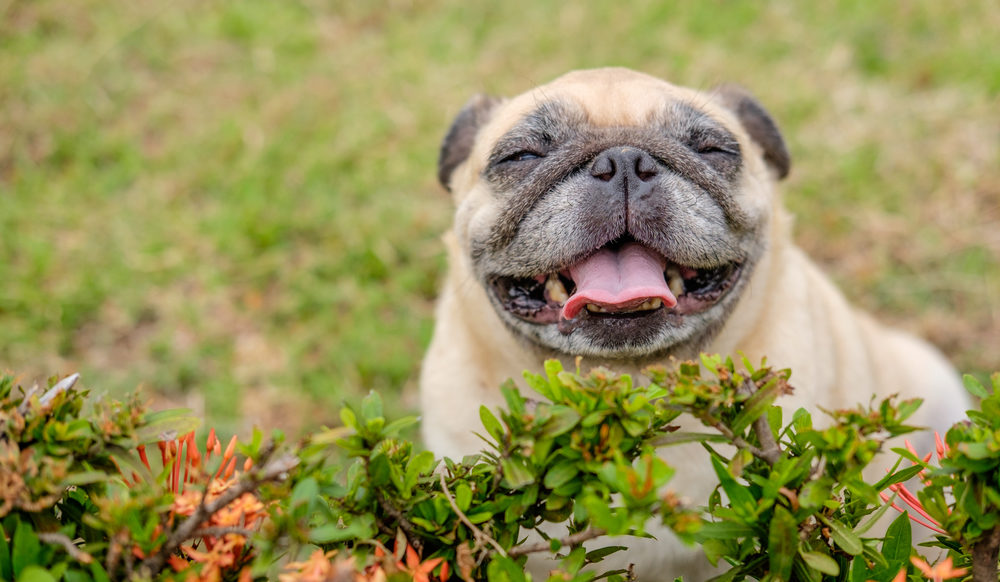Halitosis, otherwise known as doggy breath, is a common complaint among pup parents. While bad breath is certainly a nuisance, it can also indicate your dog is at risk for more serious problems. At-home dental care is a great way to slow the effects of dental disease, but nothing is as effective as having your dog’s teeth cleaned professionally.

What effect can dental disease have on your dog?
According to the veterinary publication, DVM 360, periodontal disease is the most common health problem small animal practitioners see today. Statistics indicate 80% of canines have some form of dental disease by the age of three.
Unfortunately for our dogs, periodontal disease means more than just bad breath. It causes inflammation of the gums, roots, and ligaments that anchor the teeth within the jaw. Over time, plaque and bacteria spread below the gumline creating pockets of infection that break down and destroy teeth. As you can imagine, this process is painful and can lead to poor appetite, weight loss and depression.
In cases of advanced dental disease, bacteria enters the bloodstream, putting dogs at risk for more serious illnesses like heart disease and failure of the kidneys and/or liver.
Why is it important to have your dog’s teeth cleaned professionally?
A 2015 poll conducted on behalf of Royal Canin found that only 7% of dog owners brush their pup’s teeth on a daily basis. The stats improve slightly for brushing “a few times a week,” and using alternative methods like dental chews and treats. But even regular brushing and top-of-the-line dental products cannot match the restorative power of professional dental cleanings.
“If we’re not going to brush our pets’ teeth, then we need to get comfortable with the fact that this procedure will be necessary,” writes veterinarian, Andy Rourk. “We humans brush our teeth twice daily and still get our teeth professionally cleaned every six to 12 months. Imagine how vital that cleaning would be if we never brushed! Even with regular brushing, our pets may need periodic professional dental cleanings.”
As previously mentioned, failing to care for our dogs’ teeth can have dire consequences to their health and quality of life. Dr. Rourk confesses he is not among the 7% of daily doggy tooth brushers, but he “never gives up the dream.” In the meantime, he recommends feeding a high quality diet and planning on having your dog’s teeth cleaned professionally every six to 12 months.

What is involved in a professional dental cleaning?
In the days – weeks before the procedure:
- Your dog’s journey to dental health begins well before the day of the procedure. Veterinarians often notice signs of tartar buildup and periodontal disease during routine physical exams. In other cases, the owner may bring the dog in specifically to have its teeth checked after noticing foul breath, drooling or trouble eating.
- During this initial visit, your vet will discuss the risks and rewards of having your dog’s teeth cleaned. He or she will also recommend diagnostic tests to help determine if your dog is healthy enough to undergo anesthesia.
- You may also receive an itemized estimate. Remember, this is just an estimate! Costs may change once your vet is able to examine your dog’s mouth more closely under anesthesia.
The day of the procedure:
- Do not provide food after a certain time the night before and the day of having your dog’s teeth cleaned. This reduces your dog’s risk of vomiting under anesthesia.
- Give your dog any prescription medications unless your vet instructs otherwise.
- When dropping off your dog, be sure to provide phone number(s) where the staff can reach you throughout the day.
During the procedure:
- Once your dog is under anesthesia, your vet will conduct a thorough exam of the mouth.
- Your dog will receive oxygen and anesthetic gas through a tracheal tube. Most vets also insert an IV catheter and administer fluids.
- Your vet will use an ultrasonic scaler to chip away plaque and tartar from your dog’s teeth. This tool works by vibrating at a high speed.
- He or she will use a hand scaler to remove smaller bits of debris and to clean the sides of the teeth and under the gumline.
- After removing all the plaque and tartar, the vet will polish the surfaces of the teeth and apply fluoride.
- The staff will use blankets and body warmers to prevent a drop in your dog’s core temperature as he recovers from the anesthetic.
- Most dogs are able to go home the same day with a few simple instructions.
Are professional dental cleanings safe?
As with any procedure involving general anesthesia, there is always some degree of risk. However, when you consider the consequences of advanced dental disease, the benefits usually outweigh this concern.
However, you should still do your homework before having your dog’s teeth cleaned. During the preliminary visit, ask your vet to explain the procedure and discuss your dog’s individual anesthetic risks. For example, older dogs and brachycephalic (short muzzled) breeds tend to have a slightly higher risk for adverse reactions.

Why don’t more owners have their dog’s teeth cleaned?
Many owners do not even think about having their dogs’ teeth cleaned until they notice tell-tale signs like bad breath or difficulty chewing. Since dogs often hide their discomfort, they may not receive treatment until their dental health has already deteriorated.
Additionally, dental cleanings can be relatively expensive when compared to at-home oral care products. Costs depend on several factors including where you live and the severity of your dog’s dental disease. Prices may range from a few hundred dollars to well over a thousand when you factor in high-cost items like anesthesia, X-rays, and complicated extractions.
Dr. Judy Morgan says lower cost clinics may not include important services like pre-operative bloodwork and radiographs in their dental packages. In some cases, saving money may mean sacrificing quality of care.
“It’s difficult to compare pricing because someone with a lower cost may not be providing pre-op screening, IV fluids, or certified technicians.”
Finally, some pet parents may be too nervous to have their dog’s teeth cleaned. While it is perfectly normal to worry, dental procedures are generally quite safe. As discussed above, feel free to ask questions about exactly what precautions the staff take to protect the dogs in their care.

 Toledo, United States.
Toledo, United States.